Mabray “Doc” Kountze
last updated by Surella on December 1st, 2005 at 4:49 pm |
“Doc” Kountze pictured here on the left in the photo that accompanied his regular column in The Medford Transcript. |
| The Power of Words…
Mabray “Doc” Kountze spent a lifetime writing and breaking boundaries. A spokesman for the Negro Baseball League, he was the first African-American to receive a press pass from the Red Sox (as well as the Braves and the Bruins). “Doc” reported for The Medford Transcript, The Medford Mercury, The Boston Guardian, The Boston Chronicle and The Boston Greater News and penned three books, all histories: This Is Your Heritage and 50 Sports Years Along Memory Lane, and A History of the Early Colored Press in Massachusetts and a Second Sketch of the Boston Guardian. Having organized the National Negro Newspaper All-American Association of Sports Editors (NNNAA) in the 1930’s, his newspaper work often pushed the question of the segregation of the baseball leagues and “Doc” is credited by many with the eventual desegregation of the Red Sox. In his life he was recognized for his civic work on several occasions: He received the Boston College Annual Griot Award, was honored at Fenway Park in a tribute to the Negro Baseball League, and plays and festivals have been organized in his honor in his hometown of West Medford.** |
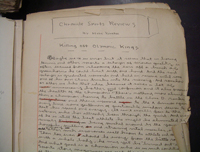 |
a handwritten draft of an article by Mabe, as found tucked into Hillard Kountze’s scrapbook. click to enlarge. (for more scrapbook bits, see Hillard’s page) |
Books Written by Mabray
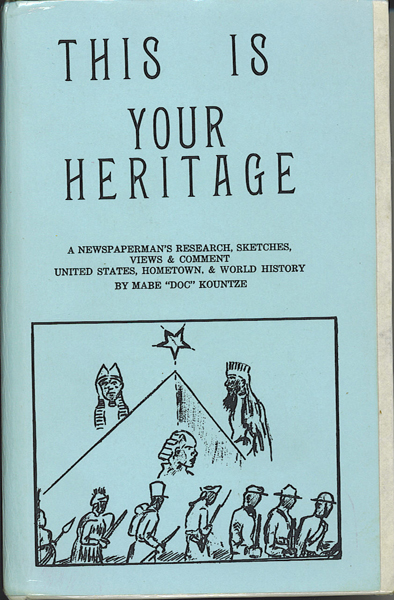 |
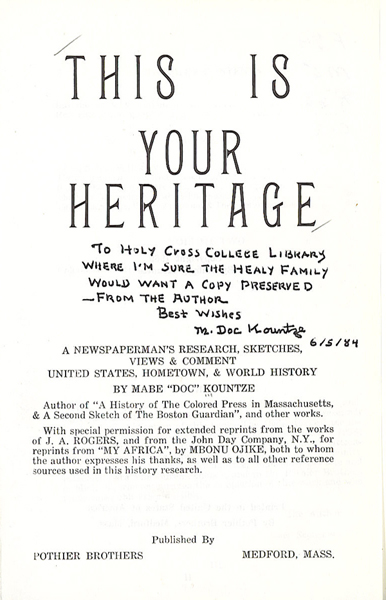 |
click the thumbnails on the left to enlarge |
| This is Your Heritage. by Mabe “Doc” Kountze. Pothier Brothers: Medford, MA, 1969. | ||
|
Excerpted from the preface of This is Your Heritage: “The primary objective of this book is to educate, provide and promote better inter-racial understanding, and to reveal, where ever possible, the fallacy of racial differences and superiorities…This book seeks to do away with the fabricated fallacy that says race and color should, and must, be a wall between us” (Kountze IV). The book is divided into several sections the first of which details early history from Africa to the New World, and the second book includes colonial and United States history. The rest of the book was almost exclusively dedicated to the hometown of the author, Medford. Interestingly, Medford has some very fascinating ties to slavery. Not only did many free men migrate to Medford (and slaves forcibly brought), but also Medford (or Meadford) was a colonial rum producing city that exported to Africa and additionally ships built in Medford were used by those in the slave trade. Another area of interest for the author was Medford’s African American military history which dates all the way back to early colonial wars. This great show of patriotism for their country has been largely glossed over by history. The next book detailed the religious history of Medford which is very rich and varied. The fifth book describes the education and economic highlights of Medford. According to Kountze, “Deep, prideful, independent, inherent desire of both men and women, to work hard for their own community, their own living and advancement, is one of the foremost features of our Medford history” (261). Medford civic and social aspects are discussed in great length in book six, and the last book contains a record of Medford’s creative achievements in a range of professions from jazz musicians and dancers to artists and writers. While there is a clear focus on the town of Medford, Kountze used Medford as a representative of African American communities in the United States. This very thick and detailed book shows a rare glimpse at not only an overall picture of African American history but also with a contemporary focus on the personalities that made up the city of Medford. What is clear from the author’s description is that Medford leaves a legacy of distinguished African American pioneers that have served their community of Medford and the larger community as a whole. >> summary by Aliza Krevolin |
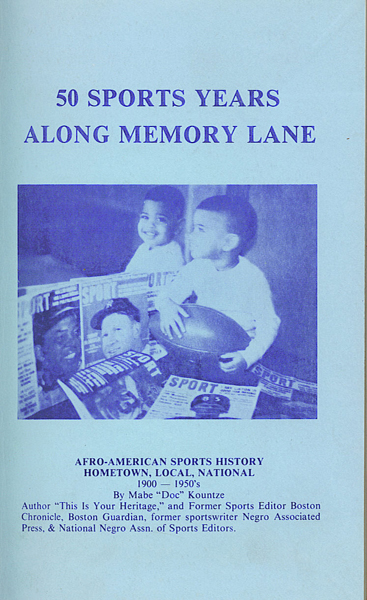 |
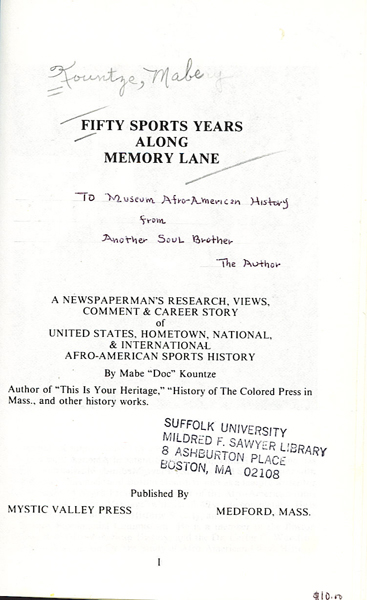 |
click the thumbnails on the left to enlarge |
| 50 Sports Years Along Memory Lane. by Kountze, Mabe “Doc.” Mystic Valley Press: Medford, MA, 1979. | ||
| This book details African American sports history from 1900-1950’s from the point of view of a former Sports Editor of the Boston Chronicle and the Boston Guardian and former Sportswriter for the Negro Associated Press and the National Negro Association of Sports Editors. He gives honor and credit to the many African American athletes who have paved the way for succeeding generations. Within this book, the reader will find a myriad of information on fishing, swimming, baseball, track, hockey, tennis, soccer, cricket, basketball, golf, horse racing, boxing, wrestling, bike racing, and football. Truly fascinating are the portraits of the great athletes and teams from the Boston area, especially Medford. It is a great achievement that this book is part of the “vital and ongoing efforts to put all Afro-American history into the printed records and the libraries of the world” (Kountze 186). >> summary by Aliza Krevolin |
A History of the Early Colored Press in Massachusetts and a Second Sketch of the Boston Guardian. Kountze, Mabe. July 10, 1967.
In this book Mabe Kountze gives a name and recognition to the press pioneers who were forgotten in history including women writers and editors who have largely been ignored because of their race. Kountze details the history of the earliest African American newspapers and those who made them a success. Since African American news and views were not being printed in the large newspapers like the Boston Globe and the Boston Herald, a large number of African American presses sprung up. In Boston, it was the Guardian and the Chronicle that Mabe Kountze admired the most for breaking boundaries and exceeding all expectations. It is important to note that Mabe Kountze worked for both these distinguished papers (Sports Editor and later Associate-Editor) which lends a bias but also provides a very intimate and detailed look at the people behind the newspaper and their trials and tribulations. >> summary by Aliza Krevolin
**Works referenced: Glenn Stout, “Tryout and Fallout: Race, Jackie Robinson, and the Red Sox,” The Massachusetts Historical Review NA 2004
